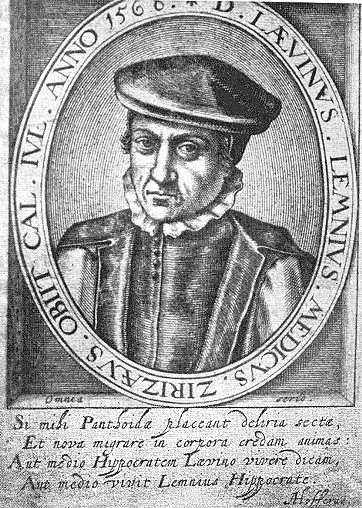Levinus Lemnius
Levinus Lemnius (1505 – 1 July 1568) was a Dutch physician and author, known for his works in medicine, philosophy, and natural sciences. Born in Zierikzee, in what is now the Netherlands, Lemnius was a prominent figure of the Renaissance period, contributing significantly to the medical and scientific knowledge of his time.
Early Life and Education[edit | edit source]
Levinus Lemnius was born into a well-educated family. His father was a doctor, which likely influenced Lemnius's early interest in medicine. He pursued his education at the University of Leuven, where he studied philosophy and medicine, showing a keen interest in both the theoretical and practical aspects of the field.
Career[edit | edit source]
After completing his studies, Lemnius traveled extensively throughout Europe, furthering his education and gaining a wide range of experiences. He eventually returned to the Netherlands, where he practiced medicine, gaining a reputation for his skill and knowledge. Lemnius's contributions to medicine were not limited to his practice. He was also a prolific writer, authoring several works that combined his medical knowledge with his interests in natural philosophy and the humanities. His writings covered a broad range of topics, including human physiology, psychology, and the natural world.
Notable Works[edit | edit source]
One of Lemnius's most famous works is De Occultis Naturae Miraculis (On the Hidden Miracles of Nature), published in 1559. This book explores various aspects of natural philosophy and medicine, discussing the human body, the soul, and the connection between the two. It reflects Lemnius's belief in the importance of harmony between the body and the soul for achieving health and well-being. Another significant work by Lemnius is De Habitu et Constitutione Corporis (On the Condition and Constitution of the Body), which focuses on human physiology and health. In this book, Lemnius emphasizes the importance of a balanced lifestyle, proper diet, and exercise for maintaining health.
Legacy[edit | edit source]
Levinus Lemnius's works were widely read and respected during his lifetime and continued to be influential after his death. His approach to medicine, which integrated physical, psychological, and spiritual aspects, was ahead of his time and contributed to the development of holistic approaches to health and healing. Lemnius's writings also reflect the Renaissance interest in exploring and understanding the natural world through observation and study, a philosophy that laid the groundwork for the scientific revolution.
Death[edit | edit source]
Levinus Lemnius died on 1 July 1568 in Zierikzee. His legacy lives on through his contributions to medicine and the natural sciences, as well as through the continued interest in his works.
Search WikiMD
Ad.Tired of being Overweight? Try W8MD's physician weight loss program.
Semaglutide (Ozempic / Wegovy and Tirzepatide (Mounjaro / Zepbound) available.
Advertise on WikiMD
|
WikiMD's Wellness Encyclopedia |
| Let Food Be Thy Medicine Medicine Thy Food - Hippocrates |
Translate this page: - East Asian
中文,
日本,
한국어,
South Asian
हिन्दी,
தமிழ்,
తెలుగు,
Urdu,
ಕನ್ನಡ,
Southeast Asian
Indonesian,
Vietnamese,
Thai,
မြန်မာဘာသာ,
বাংলা
European
español,
Deutsch,
français,
Greek,
português do Brasil,
polski,
română,
русский,
Nederlands,
norsk,
svenska,
suomi,
Italian
Middle Eastern & African
عربى,
Turkish,
Persian,
Hebrew,
Afrikaans,
isiZulu,
Kiswahili,
Other
Bulgarian,
Hungarian,
Czech,
Swedish,
മലയാളം,
मराठी,
ਪੰਜਾਬੀ,
ગુજરાતી,
Portuguese,
Ukrainian
Medical Disclaimer: WikiMD is not a substitute for professional medical advice. The information on WikiMD is provided as an information resource only, may be incorrect, outdated or misleading, and is not to be used or relied on for any diagnostic or treatment purposes. Please consult your health care provider before making any healthcare decisions or for guidance about a specific medical condition. WikiMD expressly disclaims responsibility, and shall have no liability, for any damages, loss, injury, or liability whatsoever suffered as a result of your reliance on the information contained in this site. By visiting this site you agree to the foregoing terms and conditions, which may from time to time be changed or supplemented by WikiMD. If you do not agree to the foregoing terms and conditions, you should not enter or use this site. See full disclaimer.
Credits:Most images are courtesy of Wikimedia commons, and templates, categories Wikipedia, licensed under CC BY SA or similar.
Contributors: Prab R. Tumpati, MD




